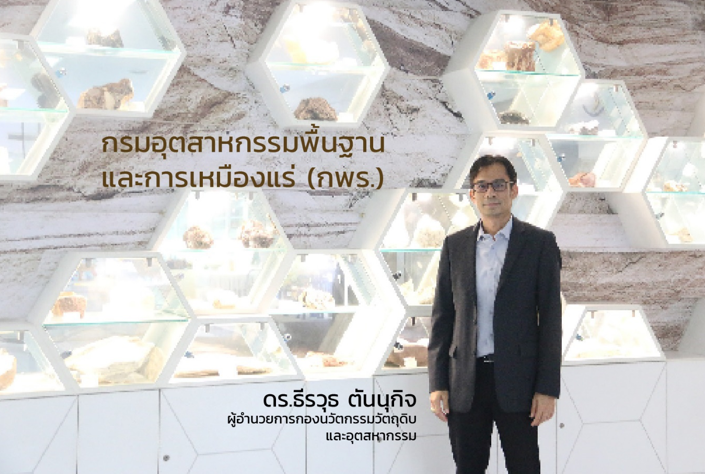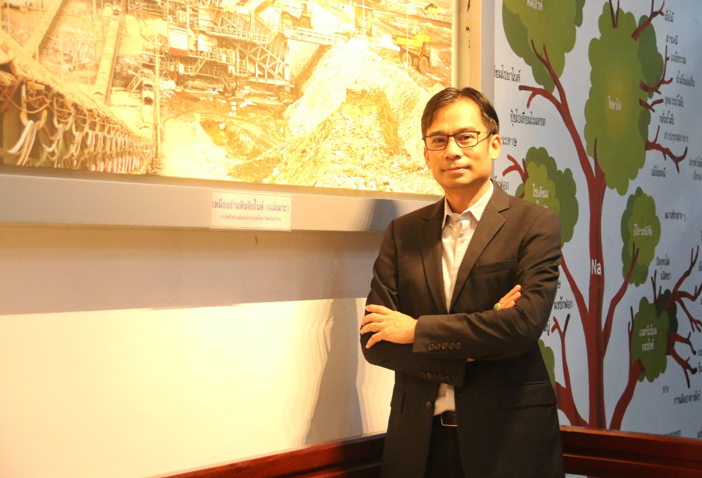

Department of Primary Industries and Mines (DPIM)
The Department of Primary Industries and Mining (DPIM) adheres to its mission in procuring and managing raw materials to ensure their stability for the industrial sector. These include Primary Raw Materials from natural resources and Secondary Raw Materials from recycled waste. The ultimate aim of DPIM is to support the development of the country’s target industries and enhance the sustainable competitiveness of Thai businesses, focusing on the efficient use of resources conforming to the principles of the Circular Economy (CE).
Dr. Teerawut Tannukit, the Director of the Department of Innovation in Raw Materials and Primary Industries Division (DPIM), stated, “The Ministry of Industry has entrusted the department as the principal agency responsible for implementing the policies related to the Ministry’s circular economy agenda. We prioritize the efficient and sustainable use of resources to maximize benefits and value in alignment with the National Economic and Social Development Plan No. 13 (2566-2570). We aim to contribute to the country’s transition towards a circular economy and a low-carbon society, including achieving Carbon Neutrality and Net Zero Greenhouse Gas Emission.”
“Up until now, DPIM has been actively promoting and uplifting industrial entrepreneurs towards a comprehensive circular economy. DPIM undertook various initiatives, disseminating knowledge of the circular economy among entrepreneurs. We also established criteria and performance indicators for evaluating the application of circular economy (CE) principles within organizations. We followed the Ministry of Industry’s Circular Economy Guidelines for Organizations (Framework for Implementing the Principles of the Circular Economy in Organizations – Guide:2-2562). DPIM implemented an online evaluation system that enabled entrepreneurs to self-assess their efforts toward achieving a circular economy. Additionally, DPIM committed to promoting and developing high-quality raw material production technologies to ensure efficient use of resources. The department encouraged the adoption of Design for Circular Economy principles, thus facilitating entrepreneurs’ transition to Industry 4.0, enhancing production efficiency, and reducing wastes.
Furthermore, DPIM focused on upgrading standards and technology to connect businesses with the Global Value Chain, emphasizing the significance of the circular economy and sustainable development. The department also encouraged enterprises to adopt proper waste separation and disposal methods, prioritizing safety and environmental friendliness. DPIM promoted the use of ecologically-friendly recycling technologies to convert waste into raw materials or products through its Research and Development Center for Circular Economy Technologies. The department recognized and honored industrial entrepreneurs who successfully applied circular economy principles, deeming them outstanding examples. DPIM identified various sectors within the circular economy and expanded its efforts to guide entrepreneurs toward broader adoption of circular economy practices. This was achieved through the accumulation of knowledge and the development of an e-learning system.”
DPIM has selected MTEC as a consultant for its CE-related projects. One of the pivotal projects in this regard is the “Design for Circular Economy Promotion” project. This project has played a crucial role in driving Thailand towards a circular economy from its inception. Its objectives include ensuring sustainable resource utilization, reducing the consumption of new natural resources, minimizing waste generation and environmental pollution, and creating a better environmental quality for the public.”
Dr. Teerawut explained, “This project emphasizes great importance on design, covering everything from product/packaging design to production process design, material selection, consideration of usage, repair, and extending the lifespan of products, as well as end-of-life management. These aspects are directly related to materials. Since DPIM recognizes that MTEC has expertise in materials and metals technology, possesses modern testing facilities, has a strong network, and, most importantly, has a good understanding of circular economy principles, we have entrusted MTEC as the project consultant.
The project’s first year results (2565) have been highly successful, even though the participating companies may not precisely align with the target industry group initially envisioned. However, they serve as a good starting point for other entrepreneurs to learn and follow. Additionally, the project has garnered praise from the participating entrepreneurs, generating interest from several others, leading us into the project’s second year (2566).”

When asked about the expectations for the project towards the target industries in its second phase, Dr. Teerawut stated, “The goal is to expand the project’s impact to a broader sphere of industries, especially those that deplete natural resources, such as mining and metal industries that use raw materials. Additionally, it includes industries within the supply chain and industrial entrepreneurs directly or indirectly affected by international trade measures. This is in response to the global trend towards a circular economy and sustainable development.”
“The circular economy cannot be carried out by one organization. All stakeholders must work together as a network. What I would like to leave MTEC to continue and help push for change is the work done in the first year on the “Closing the Loop”[1]* project. To maintain the value of PE plastic and increase the ability to be recycled (Recyclability) with De-ink technology, MTEC has jointly proved the possibility of the nearly complete technology. It is something that should be continued for the realization of a sustainable material recycling system. If successful, new business opportunities would be created and environmental would be reduced, thus creating a good image for entrepreneurs in the school milk bag supply chain. MTEC’s past performance, which has exceeded expectations, reflects MTEC’s professionalism. It is regarded as a leading organization in research and development of metal and materials technology that truly meets the needs of DPIM’s projects,” said Dr. Teerawut.
For further information, please contact:
Ms. Puangporn Puntumakoop
Industrial and Business Liaison Section, Business Development Division
Phone: 0 2564 6500 ext. 4784
E-mail: puangpp@mtec.or.th
